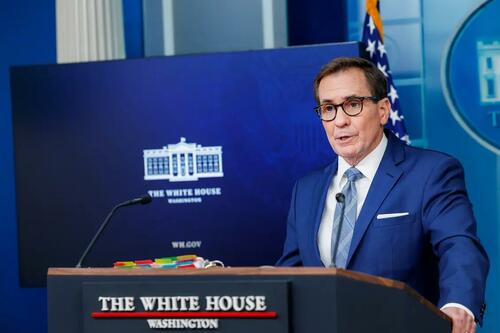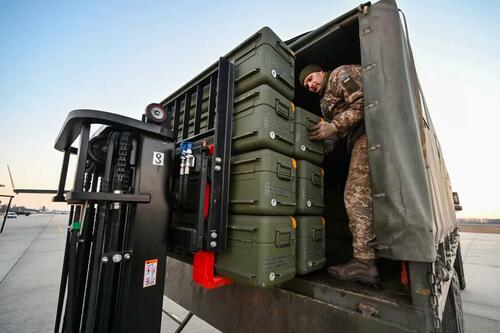
Authored by Andrew Thornebrooke via The Epoch Times (emphasis ours),
Forces from Russia and Ukraine are fighting, bleeding, and dying in the trenches of Europe’s frozen east.

After so much gore, however, the end of this conflict still seems distant, and none in power appear confident that it'll go their way.
A wild card in all this is the United States and the question of whether the world’s greatest military power can or will continue to provide direct security assistance to Ukraine.
The Biden administration, which pledged only months ago to support Ukraine for as long as it takes, is on the back foot, and money for a war on the other side of the world has run out.
Russia is waiting and eager for the opportunity to seize what it has been denied—at least, that’s what White House National Security Council spokesman John Kirby said.
“There’s significant risks to the Ukrainian armed forces if foreign aid and assistance dries up and we’re not able to continue to support them in their fight,” Mr. Kirby told The Epoch Times in December 2023.
“Ukraine is under significant threat right now from Russia, particularly from the air and drone and missile strikes on their energy infrastructure. And we know that the Russians intend to go back on the offense, particularly in the east.”

Ukraine has fought hard and won back about half the territory initially seized in Russia’s full-scale invasion. But Mr. Kirby said he fears that Ukraine’s “ability to continue to defend themselves and to rid their territory of Russian soldiers” will be compromised without supplemental U.S. funding.
“They have clawed back more than 50 percent of the territory that the Russians first took in those opening months,” he said.
“That’s not insignificant. Now, it’s due to a lot of their courage and bravery, but it’s also due an awful lot to the United States and to leadership around the world getting aid and assistance in there.”
A Partisan Issue
Whether the United States will continue that assistance remains to be seen.
In all, the United States has committed more than $44 billion in military aid to Ukraine since February 2022, with much of that in the form of presidential drawdown authorities, according to the Department of Defense.
The drawdown involves the United States transferring weapons directly to Ukraine from its own stockpiles and then spending the money to replenish its own stores.
The Pentagon has all but run out of money to replenish its stocks, so most military aid to Ukraine has, for the time being, halted.
In October 2023, President Joe Biden proposed a $105 billion supplemental spending package for Israel, Ukraine, and the U.S. southern border. Of that amount, some $44.4 billion would pass directly through the Pentagon.
The supplemental bill has stalled in Congress, where a partisan fight over its scope and priorities has erupted, throwing the future of the nation’s support for Ukraine up in the air.
The congressional gridlock mirrors U.S. popular support for the war, which began to crater amid Ukraine’s much-hyped but flagging counteroffensive last fall.

According to a survey conducted by the Chicago Council on Global Affairs in October 2023, about half of Republican voters and more than three-quarters of Democrat voters favor continuing support for Ukraine.
Similarly, a majority of Democrats believe that the United States should furnish Ukraine with military and economic support for as long as it takes the nation to win back its occupied lands; whereas a majority of Republicans believe that U.S. leadership should urge Ukraine to pursue a negotiated settlement with Russia.
Even among Republicans in Congress, however, there’s deep disagreement about what aid should be delivered to Ukraine and why.
“I do not think that we should continue funding the Ukrainian war,” Sen. J. D. Vance (R-Ohio) told The Epoch Times. “I think it’s destroying the country at this point, meaning the perpetual war is destroying the country.”
Other Republicans agree with the need to fund Ukraine but have said that President Biden should give greater precedent to domestic issues such as securing the southern border.
Sen. John Kennedy (R-La.) is among that group and has said that supplemental spending for Ukraine is a nonstarter until the Biden administration recalculates its spending priorities.

“It’s nowhere, and it’s not going anywhere,” Mr. Kennedy said to The Epoch Times about the supplemental spending package.
“Having an open border is more important to President Biden than aid to Ukraine, Taiwan, or Israel. Will that change? I don’t know.”
Democrats, too, are having difficulty imagining a new path forward.
Sen. Richard Blumenthal (D-Conn.) told The Epoch Times that swift passage of the supplemental spending package is “unlikely” but that he remains “hopeful” for a compromise early in the year.
Sen. John Fetterman (D-Pa.) told The Epoch Times that he had “no idea” whether the supplemental request would pass but that Congress should approve “critical aid” to U.S. allies and partners, including Ukraine and Israel.
Assistant Secretary of State James O’Brien said at a hearing of the Senate Foreign Relations Committee on Nov. 8, 2023, that Russian President Vladimir Putin was “playing a waiting game.”
“He thinks that if he can wait for our elections or for Ukraine to get tired, then he can survive,” Mr. O’Brien said. “Putin says that if we walk away, Ukraine falls in weeks.”
Ukraine in a Stalemate
Most experts don’t believe that Ukraine would fall in weeks without the United States.
However, many believe it’s likely that the embattled nation would be forced into a brutal stalemate with Russia and, at some point, would need to cede some of its territory to its aggressor.
Ukraine has pushed its partners for more funding, and Ukrainian President Volodymyr Zelenskyy was in Davos, Switzerland, on Jan. 15 to propose a Global Peace Summit to chart a path toward victory for his nation.
Ukraine simply doesn’t have a viable strategy for victory without international arms shipments such as those provided by the United States, according to Peter Rough, director of the Center on Europe and Eurasia at the Hudson Institute, a conservative think tank.
“U.S. security assistance is essential for Ukraine,” Mr. Rough told The Epoch Times in an email. “There is no path forward without it.”

Ukraine could likely continue to fight and bleed Russia without U.S. arms, according to Pavel Baev, a research professor at Peace Research Institute Oslo in Norway, but it would be limited.
“Ukraine can defend against new Russian offensives, but most certainly will not be able to launch a new counteroffensive without significant and sustained U.S. military support,” Mr. Baev told The Epoch Times in an email.
Mr. Baev said Ukraine could muddle along through the harsh winter and spring conditions without more U.S. aid but would be hard-pressed to contend with Russia toe-to-toe during next summer’s military campaigns.
“A temporary pause, like the one happening now, is unhelpful but not disastrous ... [but] a permanent cut of the U.S. support grants Russia a serious advantage for the summer campaign season.”
Similarly, Dakota Wood, a senior research fellow at the Heritage Foundation, said it’s “very unlikely” that Ukraine could continue to conduct its aggressive war effort without U.S. support.
Ukraine could hurt Russian forces badly but not remove them from the occupied eastern territories, he said.
“If the U.S. stops providing support, Ukraine may find ways to continue resisting Russia for a while, such that Russia is unable to push further into Ukraine, but it will not be able to dislodge Russia from the territory it controls, and Ukraine is likely to lose more, especially along the Black Sea coast,” Mr. Wood said in an email to The Epoch Times.
Mr. Baev and Mr. Wood agreed that with European assistance alone, Ukraine could defend its current territory for some time.
European assistance isn’t guaranteed, however, and should U.S. assistance falter, European leaders would likely follow suit.
Read more here...
Authored by Andrew Thornebrooke via The Epoch Times (emphasis ours),
Forces from Russia and Ukraine are fighting, bleeding, and dying in the trenches of Europe’s frozen east.

After so much gore, however, the end of this conflict still seems distant, and none in power appear confident that it’ll go their way.
A wild card in all this is the United States and the question of whether the world’s greatest military power can or will continue to provide direct security assistance to Ukraine.
The Biden administration, which pledged only months ago to support Ukraine for as long as it takes, is on the back foot, and money for a war on the other side of the world has run out.
Russia is waiting and eager for the opportunity to seize what it has been denied—at least, that’s what White House National Security Council spokesman John Kirby said.
“There’s significant risks to the Ukrainian armed forces if foreign aid and assistance dries up and we’re not able to continue to support them in their fight,” Mr. Kirby told The Epoch Times in December 2023.
“Ukraine is under significant threat right now from Russia, particularly from the air and drone and missile strikes on their energy infrastructure. And we know that the Russians intend to go back on the offense, particularly in the east.”

Ukraine has fought hard and won back about half the territory initially seized in Russia’s full-scale invasion. But Mr. Kirby said he fears that Ukraine’s “ability to continue to defend themselves and to rid their territory of Russian soldiers” will be compromised without supplemental U.S. funding.
“They have clawed back more than 50 percent of the territory that the Russians first took in those opening months,” he said.
“That’s not insignificant. Now, it’s due to a lot of their courage and bravery, but it’s also due an awful lot to the United States and to leadership around the world getting aid and assistance in there.”
A Partisan Issue
Whether the United States will continue that assistance remains to be seen.
In all, the United States has committed more than $44 billion in military aid to Ukraine since February 2022, with much of that in the form of presidential drawdown authorities, according to the Department of Defense.
The drawdown involves the United States transferring weapons directly to Ukraine from its own stockpiles and then spending the money to replenish its own stores.
The Pentagon has all but run out of money to replenish its stocks, so most military aid to Ukraine has, for the time being, halted.
In October 2023, President Joe Biden proposed a $105 billion supplemental spending package for Israel, Ukraine, and the U.S. southern border. Of that amount, some $44.4 billion would pass directly through the Pentagon.
The supplemental bill has stalled in Congress, where a partisan fight over its scope and priorities has erupted, throwing the future of the nation’s support for Ukraine up in the air.
The congressional gridlock mirrors U.S. popular support for the war, which began to crater amid Ukraine’s much-hyped but flagging counteroffensive last fall.

According to a survey conducted by the Chicago Council on Global Affairs in October 2023, about half of Republican voters and more than three-quarters of Democrat voters favor continuing support for Ukraine.
Similarly, a majority of Democrats believe that the United States should furnish Ukraine with military and economic support for as long as it takes the nation to win back its occupied lands; whereas a majority of Republicans believe that U.S. leadership should urge Ukraine to pursue a negotiated settlement with Russia.
Even among Republicans in Congress, however, there’s deep disagreement about what aid should be delivered to Ukraine and why.
“I do not think that we should continue funding the Ukrainian war,” Sen. J. D. Vance (R-Ohio) told The Epoch Times. “I think it’s destroying the country at this point, meaning the perpetual war is destroying the country.”
Other Republicans agree with the need to fund Ukraine but have said that President Biden should give greater precedent to domestic issues such as securing the southern border.
Sen. John Kennedy (R-La.) is among that group and has said that supplemental spending for Ukraine is a nonstarter until the Biden administration recalculates its spending priorities.

“It’s nowhere, and it’s not going anywhere,” Mr. Kennedy said to The Epoch Times about the supplemental spending package.
“Having an open border is more important to President Biden than aid to Ukraine, Taiwan, or Israel. Will that change? I don’t know.”
Democrats, too, are having difficulty imagining a new path forward.
Sen. Richard Blumenthal (D-Conn.) told The Epoch Times that swift passage of the supplemental spending package is “unlikely” but that he remains “hopeful” for a compromise early in the year.
Sen. John Fetterman (D-Pa.) told The Epoch Times that he had “no idea” whether the supplemental request would pass but that Congress should approve “critical aid” to U.S. allies and partners, including Ukraine and Israel.
Assistant Secretary of State James O’Brien said at a hearing of the Senate Foreign Relations Committee on Nov. 8, 2023, that Russian President Vladimir Putin was “playing a waiting game.”
“He thinks that if he can wait for our elections or for Ukraine to get tired, then he can survive,” Mr. O’Brien said. “Putin says that if we walk away, Ukraine falls in weeks.”
Ukraine in a Stalemate
Most experts don’t believe that Ukraine would fall in weeks without the United States.
However, many believe it’s likely that the embattled nation would be forced into a brutal stalemate with Russia and, at some point, would need to cede some of its territory to its aggressor.
Ukraine has pushed its partners for more funding, and Ukrainian President Volodymyr Zelenskyy was in Davos, Switzerland, on Jan. 15 to propose a Global Peace Summit to chart a path toward victory for his nation.
Ukraine simply doesn’t have a viable strategy for victory without international arms shipments such as those provided by the United States, according to Peter Rough, director of the Center on Europe and Eurasia at the Hudson Institute, a conservative think tank.
“U.S. security assistance is essential for Ukraine,” Mr. Rough told The Epoch Times in an email. “There is no path forward without it.”

Ukraine could likely continue to fight and bleed Russia without U.S. arms, according to Pavel Baev, a research professor at Peace Research Institute Oslo in Norway, but it would be limited.
“Ukraine can defend against new Russian offensives, but most certainly will not be able to launch a new counteroffensive without significant and sustained U.S. military support,” Mr. Baev told The Epoch Times in an email.
Mr. Baev said Ukraine could muddle along through the harsh winter and spring conditions without more U.S. aid but would be hard-pressed to contend with Russia toe-to-toe during next summer’s military campaigns.
“A temporary pause, like the one happening now, is unhelpful but not disastrous … [but] a permanent cut of the U.S. support grants Russia a serious advantage for the summer campaign season.”
Similarly, Dakota Wood, a senior research fellow at the Heritage Foundation, said it’s “very unlikely” that Ukraine could continue to conduct its aggressive war effort without U.S. support.
Ukraine could hurt Russian forces badly but not remove them from the occupied eastern territories, he said.
“If the U.S. stops providing support, Ukraine may find ways to continue resisting Russia for a while, such that Russia is unable to push further into Ukraine, but it will not be able to dislodge Russia from the territory it controls, and Ukraine is likely to lose more, especially along the Black Sea coast,” Mr. Wood said in an email to The Epoch Times.
Mr. Baev and Mr. Wood agreed that with European assistance alone, Ukraine could defend its current territory for some time.
European assistance isn’t guaranteed, however, and should U.S. assistance falter, European leaders would likely follow suit.
Read more here…
Loading…





